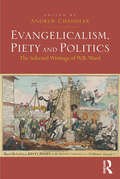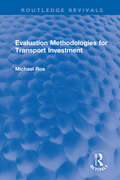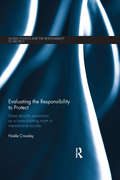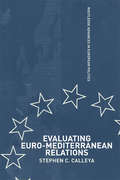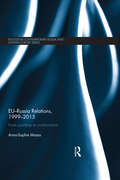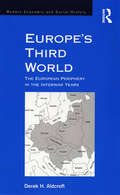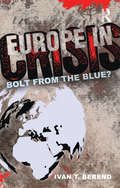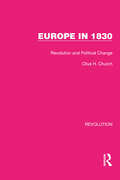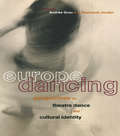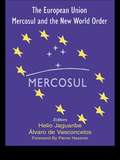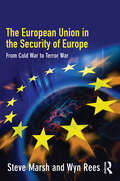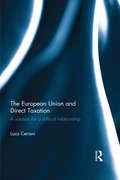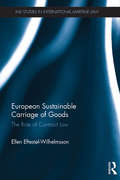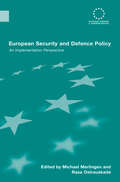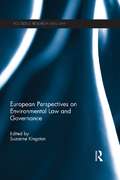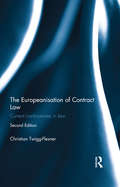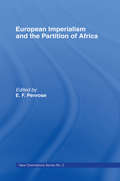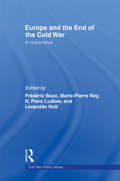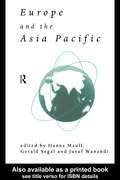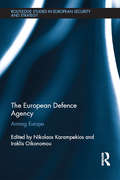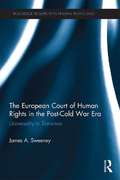Special Collections
Benetech’s Global Certified Accessible Titles
Description: Benetech’s GCA program is the first independent third-party EPUB certification to verify ebook accessibility. By creating content that is born accessible, publishers can meet the needs of all readers. Learn more: https://bornaccessible.benetech.org/
- Table View
- List View
Evangelicalism, Piety and Politics
by Andrew ChandlerW.R. Ward was one of the most influential historians of modern religion to be found at work in Britain during the twentieth century. Across fifty years his writings provoked a major reconsideration by historians of the significance of religion in society and its importance in the contexts of political, cultural and intellectual life. Ward was, above all, an international scholar who did much to repudiate any settled understanding that religious history existed in merely national categories. In particular, he showed how much British and American religion owed to the insights of Continental European thought and experience. This book presents many of Ward’s most important articles and gives a picture of the character, and extraordinary breadth, of his work. Embracing studies of John Wesley and the development of Methodism at large, the ambitions of Evangelicals in an age of international mission, the place of mysticism in evolution of Protestantism and the relations of churches and secular powers in the twentieth century, Andrew Chandler concludes that it was in such scholarship that Ward 'quietly recast the picture that we have of the past and drew our attention towards a far greater, more difficult and more interesting, landscape.'
Evaluation Methodologies for Transport Investment
by Michael RoeOriginally published in 1987, this title reviews and evaluates the methodologies suitable for highway evaluation, along with the UK transport supplementary grant and TPP (Transport Policies and Programme) system. Examples of current UK practice are briefly described, with more details being given of the technique of priority ranking used in the case study area of the West Midlands. Multi criteria approaches are reviewed in chapter two. Chapter three looks at the choice of highway data input in the light of those available, and the practical structure of factorial analysis applied to the case study area. The book covers following issues: computer structure and requirements; highway problem data; referencing methods; site definition; and weighting methods. The results from this study are described and then analysed by classical factorial analysis. The implications of the technique for the TPP preparation process, for the derivation of priorities, and the highway evaluation process as a whole are given. Specific techniques, such as factorial analysis, bridge problem and bus aid ranking, highway capacity calculations and sensitivity testing, as well as the computer programs used (March and COBA) are described in greater detail in the appendices.
Evaluating the Responsibility to Protect
by Noële CrossleyThis book evaluates the extent to which the Responsibility to Protect (R2P) has consolidated as a norm in international society. A consolidated norm in international society is defined here as a regularised pattern of behaviour that is widely accepted as appropriate within a given social context. The analysis is based on the assumption that the R2P could be regarded as a consolidated norm if it were applied consistently when genocide and other mass atrocities occur; and if international responses routinely conformed to the core principles inherent in the R2P: seeking government consent, multilateralism, prevention and regionalism. This book employs Finnemore and Sikkink’s norm lifecycle model to determine the putative norm’s degree of consolidation, with in-depth case studies of the international responses to crises in Darfur and Kenya serving to illuminate the findings. It advances the argument that, whilst the R2P had fully emerged as a prospective norm by 2005, it has not yet fully consolidated as an international norm. The R2P has been remarkably successful at pervading the international discourse but has been somewhat less successful at consistency in implementation in terms of adherence to its core principles as outlined above (the qualitative dimension of the R2P). Furthermore, it has been least successful, to date, in terms of consistency across cases in terms of resolve and tenacity. The volume concludes with a reflection on the norm's progress so far, and its prospects for further consolidation, assuming the R2P continues on its current trajectory. This book will be of much interest to students of the Responsibility to Protect, humanitarian intervention, international law, security studies and IR.
Evaluating Social Media Marketing
by Katarzyna Sanak-KosmowskaThis book is an innovative attempt to identify and analyse the processes related to social influence in online buying behaviour, with special attention given to the phenomenon of social proof, which is the basis of social media, recommendation marketing and word of mouth (WOM) marketing. It empirically verifies the factors which influence the effectiveness of social proof, as well as identifying relevant impact factors. Opening with a literature review of this concept from the perspective of social psychology, sociology and marketing, this interdisciplinary approach to the issue allows for an in-depth understanding of the mechanisms of the effective use of social proof in contemporary online marketing. Following this, in the context of theoretical considerations, the author analyses the social role and significance of social proof in the buying behaviours of online consumers. The second half of the book presents the results of the author’s quantitative and qualitative research of the effectiveness of social proof. The quantitative research verifies the hypotheses concerning the social role and significance of social proof in buying decisions and identifies the level of confidence in the opinions expressed by other web users. The qualitative research focuses on the empirical verification of the effectiveness of social proof mechanisms. Additionally, attention is given to sensitivity to social proof, i.e., the factors that increase the effectiveness of such messages, both from the sender’s and recipient’s perspective, as well as the forms and channels of communication. Written for scholars and researchers interested in the debate on the transparency of activities carried out by companies in the area of online marketing, the book’s detailed analysis of influence utilising both quantitative and qualitative studies may be of interest to a wider group of academics including economists, psychologists and sociologists.
Evaluating Euro-Mediterranean
by Stephen CalleyaFirst Published in 2004. Routledge is an imprint of Taylor & Francis, an informa company.
EU-Russia Relations, 1999-2015
by Anna-Sophie MaassThis book traces the development of EU-Russia relations in recent years. It argues that a major factor influencing the relationship is the changing internal dynamics of both parties, in Russia’s case an increasingly authoritarian state, in the case of the EU an increasing coherence in its foreign policy as applied to former Soviet countries which Russia regarded as interference in its own sphere. The book considers the impact of conflicts in Kosovo, Chechnya, Georgia and Ukraine, discusses the changing internal situation in both Russia and the EU, including the difficulties in overcoming fragmentation in EU policy-making, and concludes by assessing how the situation is likely to develop.
Europe's Third World
by Derek H. AldcroftEconomic historians have perennially addressed the intriguing question of comparative development, asking why some countries develop much faster and further than others. Focusing primarily on Europe between 1914 and 1939, this present volume explores the development of thirteen countries that could be said to be categorised as economically backward during this period: Albania, Bulgaria, Estonia, Greece, Hungary, Latvia, Lithuania, Poland, Portugal, Romania, Spain, Turkey and Yugoslavia. These countries are linked, not only in being geographically on Europe's periphery, but all shared high agrarian components and income levels much lower than those enjoyed in western European countries. The study shows that by 1918 many of these countries had structural characteristics which either relegated them to a low level of development or reflected their economic backwardness, characteristics that were not helped by the hostile economic climate of the interwar period. It explores, region by region, how their progress was checked by war and depression, and how the effects of political and social factors could also be a major impediment to sustained progress and modernisation. For example, in many cases political corruption and instability, deficient administrations, ethnic and religious diversity, agrarian structures and backwardness, population pressures, as well as international friction, were retarding factors. In all this study offers a fascinating insight into many areas of Europe that are often ignored by economists and historians. It demonstrates that these countries were by no means a lost cause, and that their post-war performances show the latent economic potential that most harboured. By providing an insight into the development of Europe's 'periphery' a much more rounded and complete picture of the continent as a whole is achieved.
Europe in Crisis
by Ivan BerendThis book analyzes the European Great Recession of 2008-12, its economic and social causes, its historical roots, and the policies adopted by the European Union to find a way out of it. It contains explicit debates with several economists and analysts on some of the most controversial questions about the causes of the crisis and the policies applied by the European Union. It presents the cases of Iceland, Greece and Ireland, the countries that first declined into crisis in Europe, each of them in a different way. Iceland is a case study for reckless banking practices, Greece of reckless public spending, and Ireland of reckless household indebtedness. At least seven other countries, mostly from the peripheries of Europe, had similarly reckless banking and spending practices. In the center of the book are the economic and social causes of the crisis. Contemporary advanced capitalism became financialized, de-industrialized and globalized and got rid of the "straitjacket" of regulations. Solid banking was replaced by high-risk, "casino-type" activity. The European common currency also had a structural problem — monetary unification without a federal state and fiscal unification. The other side of the same coin is European hyper-consumerism. A new lifestyle emerged during two super-prosperous periods in the 1950s to 1960s, and during the 1990s to 2006. Trying to find an exit policy, the European Union turned to strict austerity measures to curb the budget deficit and indebtedness. This book critically analyzes the debate around austerity policy. The creation of important supra-national institutions, and of a financial supervisory authority and stability mechanisms, strengthens integration. The correction of the euro’s structural mistake by creating a quasi-fiscal unification is even more important. The introduction of mandatory fiscal rules and their supervision promises a long-term solution for a well-functioning common currency. These measures, meanwhile, create a two-tier European Union with a fast-track core. This book suggests that the European Union will emerge stronger from the crisis. This book will be of particular interest to students and researchers of economics, history, political science and international finance, but will also prove profitable reading for practitioners and the interested public.
Europe in 1830
by Clive H. ChurchThis book, first published in 1983, is a valuable corrective to the lack of academic research on the events of 1830 – a year of revolutions across the continent of Europe. Social protests and political changes are examined to note the causes of the political turmoil and revolution in 1830, and then the results of the revolutions’ developments are analysed, as general European social, political and diplomatic crises as well as a series of individual outbreaks. The book also turns to comparative study to look at the hows and wherefores of the revolutions, as the dynamics, participants and effects of revolution are examined in turn.
Europe Dancing
by Andree Grau and Stephanie JordanEurope Dancing examines the dance cultures and movements which have developed in Europe since the Second World War. Nine countries are represented in this unique collaboration between European dance scholars. The contributors chart the art form, and discuss the outside influences which have shaped it. This comprehensive book explores: * questions of identity within individual countries, within Europe, and in relation to the USA * the East/West cultural division * the development of state subsidy for dance * the rise of contemporary dance as an 'alternative' genre * the implications for dance of political, economic and social change. Useful historical charts are included to trace significant dance and political events throughout the twentieth century in each country. Never before has this information been gathered together in one place. This book is essential reading for everyone interested in dance and its growth and development in recent years.
European Vocational Educational Systems
by Collins, HelenThis detailed reference work describes the vocational training systems available in EC member states. It deals with the vocational qualification systems within each country and outlines EC programmes that promote the recognition of training schemes.
The European Union, Mercosul and the New World Order
by Helio Jaguaribe and Alvaro VasconcelosA critical insight into the politics and economics of relations between the EU and Latin America, particularly Mercosul, highlighting the significance of such relations for multilateralism and the international order.
The European Union in the Security of Europe
by Steve Marsh and Wyn ReesThis book examines the European Union’s contribution to providing security in Europe amidst an increasingly complex and challenging environment. In this new and comprehensive guide to the EU's role in security since the end of the Cold War, the authors offer an explanation of EU internal and external security regimes, and argue that the Union has become an important exporter of security within its region. However, the Union’s rhetorical ambitions and commitments continue to outstrip its capabilities and it lacks both a common conceptualisation of security and a meaningful, shared strategic culture. Drawing extensively on primary sources the book examines the Union’s relations with the US and Russia in a time of shifting geostrategic calculations and priorities. With the EU capacity for enlargement slowing, this text presents a detailed assessment of EU security policies towards Central Europe, the Mediterranean, the Western Balkans, Eastern Europe and South Caucasus. European Union Security will be of interest to students and scholars of the EU, security studies, and international relations.
The European Union and Direct Taxation
by Luca CerioniWithin the European Union, direct taxation is an area which often provokes controversy due to tensions between the tax sovereignty of the individual Member States and the desire for an integrated internal market. This book offers a critical review of the legislative and case-law developments in this area at the EU level, and reviews the European Commission’s proposed solutions in light of their concerns regarding the proper functioning of the EU’s internal market. Luca Cerioni set out a series of benchmarks determined from the objectives expressed by the European Commission, including: the elimination of double taxation and double non-taxation; the simplification of cross-border tax compliance; the reduction of abusive forum-shopping practices and general aggressive tax planning strategies; legal certainty for all businesses and individuals carrying on activities and receiving income in more than one EU Member State. Cerioni uses these benchmarks to ask which Directives and/or rulings have left legal uncertainty, and which have ended up creating or increasing the scope for aggressive tax planning. The book puts forward a comprehensive solution for a new optimal regime relating to tax residence, which would contribute to the EU project to the mutual benefit of Member States and taxpayers. As a thorough and critical discussion of EU tax rules in force, and of the European Court’s case law in direct taxation, this book will be of great use to academic researchers and students of EU law, tax practitioners, and policy-makers at the EU and national level.
European Sustainable Carriage of Goods
by Ellen Eftestøl-WilhelmssonThis work discusses the rapidly developing European transport policy on sustainable freight and the connected efforts initiated by the European Commission (EC) on greening transport by the means of contract law. Greening transport has been a central goal for the EU for decades. The main problem has been, and still is, that far too much carriage of goods within the EU is performed unimodally: by road carriage alone. This has caused severe problems particularly in central Europe, where both trade and environment is suffering from an ineffective transport industry with growing problems of congestion and pollution. A modal shift in transport from mainly road based to a form of transport in which more environmental friendly modes such as rail, inland waterways and sea born transport are integrated into one transport chain, is hence an objective of the EU. If successful, this model could then be extended to the international transport community. The key question raised in this book is whether the traditional role of contract law is changing to such an extent that the parties involved must take external interests into account. In the case of the EU’s efforts to enhance sustainable carriage of goods within its realm, the author explores whether governmental interference is necessary, or if we can trust that the parties will integrate environmental issues into their contracts because there is a demand for such clauses. The different proposals for an EU regime on multimodal contracts of carriage are discussed in this context. This book will be of great relevance to academics and practitioners with an interest in EU law, transport law, environmental law and maritime law in general.
European Security in the Twenty-First Century
by Adrian Hyde-PriceCombining a sophisticated theoretical analysis with detailed empirical case-studies, this book provides an original view of the challenges and threats to a stable peace order in Europe. The end of Cold War bipolarity has transformed Europe. Using structural realist theory, Adrian Hyde-Price analyzes the new security agenda confronting Europe in the twenty-first century. Europe, he argues, is not ‘primed for peace’ as mainstream thinking suggests, rather, it faces new security threats and the challenge of multipolarity. This critical and original volume looks at European security after the Iraq War, the failure of the EU constitution and the change of government in Germany. Reflecting on the inherently competitive and tragic nature of international politics, it concludes that realism provides the only firm foundations for an ethical foreign and security policy. European Security in the Twenty-First Century will appeal to students and scholars of international relations, European politics and security studies.
European Security and Defence Policy
by Michael Merlingen and Rasa OstrauskaiteSecurity and defence is the area in which the EU has advanced most in recent years. A principal element of this process is the proliferating number of military and civilian crisis management missions in Europe, the Middle East, Africa and Asia. Clearly, Europe has come a long way since the disappointments and frustration in the 1990s, when, in light of the violent disintegration of Yugoslavia, analysts argued that the EU foreign and security policy was ‘neither common, nor foreign, nor dealing with security, nor (could) be called a policy.’ Since then the newly developed European Security and Defence Policy (ESDP) has become the necessary framework for the formulation and implementation of effective European security policy. This book is the first-ever in-depth inquiry of the ESDP in action. It analyzes the implementation of military and civilian missions in the Balkans, Southern Caucasus, Africa and Asia and asks what impact they have on the ground. The EUJUST Themis in Georgia, the Aceh Monitoring Mission in Indonesia as well as EUSEC-R.D. Congo and EUPOL Kinshasa are examined in The European Security and Defence Policy will be of interest to students and scholars of international relations, security, European studies, foreign policy, peacekeeping and transatlantic relations.
European Perspectives on Environmental Law and Governance
by Suzanne KingstonThis book provides a range of perspectives on some of the most pressing contemporary challenges in EU environmental law and governance from some of today’s leading European environmental academics and practitioners. The book maintains a focus on three key cross-cutting issues, each of which is carefully analysed through the lens of governance. The first theme to be addressed is that of climate change and the problems it poses for EU governance. The second issue explored concerns the challenge of integrating environmental considerations into other policy areas, as is required by the Treaty on the Functioning of the European Union and the EU’s Charter of Fundamental Rights. Finally, the third theme centres on the important challenge of improving environmental enforcement within the EU, and considers issues such as the Aarhus Convention and the evolution of the Commission’s work on implementation and enforcement throughout the past twenty years. Each of these three themes is situated within the broader ongoing debate about the changing nature of European environmental governance post-Lisbon and the ways in which developments in this area fits within broader trends in European governance theory and policy generally. European Perspectives on Environmental Law and Governance contains contributions from experts in the field including; Mary Robinson, Alan Boyle, Ludwig Kramer and Liam Cashman, and will be of interest to academics, students and practitioners of EU environmental law.
The Europeanisation of Contract Law
by Christian Twigg-FlesnerCritical yet accessible, this book provides an overview of the current debates about the ‘Europeanization’ of contract law. Charting the extent to which English contract law has been subject to this activity, it is the ideal volume for readers unfamiliar with the subject who wish to understand the main issues quickly. It examines a range of key developments, including: a string of directives adopted by the European Union that touch on various aspects of consumer law recent plans for a European Common Frame of Reference on European Contract Law. Bringing together advanced legal scholarship, critically examining key developments in the field and considering the arguments for and against greater convergence in the area of contract law, this is an excellent read for postgraduate students studying contract and/or European law.
European Imperialism and the Partition of Africa
by Ernest Francis PenroseThis volume seeks to explain the European partition of Africa between 1880-1900.
The European Idea in History in the Nineteenth and Twentieth Centuries
by Alexander TchoubarianFirst Published in 1995. Routledge is an imprint of Taylor & Francis, an informa company.
Europe and the End of the Cold War
by N. Piers Ludlow and Marie-Pierre Rey and Frédéric Bozo and Leopoldo NutiThis book seeks to reassess the role of Europe in the end of the Cold War and the process of German unification. Much of the existing literature on the end of the Cold War has focused primarily on the role of the superpowers and on that of the US in particular. This edited volume seeks to re-direct the focus towards the role of European actors and the importance of European processes, most notably that of integration. Written by leading experts in the field, and making use of newly available source material, the book explores "Europe" in all its various dimensions, bringing to the forefront of historical research previously neglected actors and processes. These include key European nations, endemic evolutions in the Soviet Union and Eastern Europe, European integration, and the pan-European process. The volume serves therefore to rediscover the transformation of 1989-90 as a European event, deeply influenced by European actors, and of great significance for the subsequent evolution of the continent.
Europe and the Asia-Pacific
by Gerald Segal and Hanns Maull and Jusuf WanandiEurope and the Asia-Pacific is the most wide-ranging and accessible book currently available on the increasingly important relationship between these two regions. Compiled by leading experts, it covers the historical background, contemporary political setting and the vitally important economic aspects of this relationship. Moving on to deal with security considerations and policy decisions it provides valuable insights into the developing partnership between Europe and the Asia-Pacific. Rigorous and up-to-date, it is born out of the work of the Council for Asia-Europe cooperation (CAEC), a body of think tanks that supports the Asia-Europe Summit Meeting (ASEM) process.
The European Defence Agency
by Nikolaos Karampekios and Iraklis OikonomouThis volume provides a comprehensive understanding of the European Defence Agency (EDA), the leading EU armaments policy institution. Despite its critical role in European strategic and military affairs as the key hub of European policy-making in the field of armaments, the Agency has hitherto received very little attention by the academic and research community around Europe. To fill this gap in the literature, the book covers a multitude of inter-related themes and topics. Not only does it provide a detailed analysis and assessment of the Agency’s record as the first institution dealing solely with EU armaments policy, but it also links these findings to international relations and European integration theory. Thematically, the contributions go beyond the mere description of achievements, gaps and risks, elaborating on novel themes such as space, offsets, pooling and sharing, and transatlantic armaments relations. The book combines an interdisciplinary approach to the study of European defence with theoretical and ontological pluralism, and seeks to unveil the strategic, industrial, institutional and ideational sources of armaments collaboration and capability development under the aegis of the EDA. The multi-faceted orientation of the book will be of much interest to students of European security, EU institutions, defence studies, arms control and international relations in general.
The European Court of Human Rights in the Post-Cold War Era
by James A. SweeneyThe European Court of Human Rights in the Post-Cold War Era: Universality in Transition examines transitional justice from the perspective of its impact on the universality of human rights, taking the jurisprudence of the European Court of Human Rights as its detailed case study. The problem is twofold: there are questions about differences in human rights standards between transitional and non-transitional situations, and about differences between transitions. The European Court has been a vital part of European democratic consolidation and integration for over half a century, setting meaningful standards and offering legal remedies to the individually repressed, the politically vulnerable, and the socially excluded. After their emancipation from Soviet influence in the 1990s, and with membership of the European Union in mind for many, the new democracies of Central and Eastern Europe flocked to the Convention system. The voluminous jurisprudence of the European Court of Human Rights can now give us some clear information about how an international human rights law regime can interact with transitional justice. The jurisprudence is divided between those cases concerning the human rights implications of explicitly transitional policies (such as lustration), and those that involve impacts upon specific democratic rights during the transition. The book presents a close examination of claims by states that transitional policies and priorities require a level of deference from the Strasbourg institutions. The book proposes that states’ claims for leeway from international human rights supervisory mechanisms during times of transition can be characterised not as arguments for cultural relativism, but for ‘transitional relativism’.
